PSYCHOMANIA: Is This The Greatest Terrible Movie Ever Made?
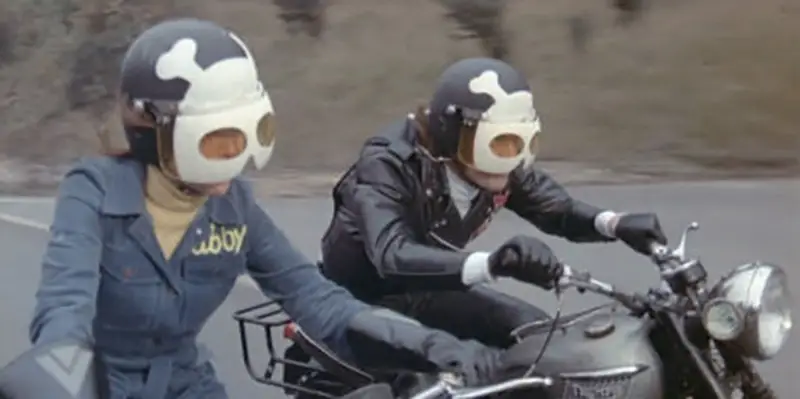
Lapsed scriptwriter and dad, currently failing to encourage my children…
‘So Bad They’re Good’ movies are a thing now. Movie list websites are awash with them. Troll 2 is often the high-watermark, and it appears that most of these no-budget horrors tend to be of American origin.
However, the UK can hold its own proudly in this category, and one champion in particular is about to announce itself to the world afresh with a lavish BluRay debut. Ladies and Gentlemen, I give you…Psychomania.
Perfectly Ghastly
The early 1970s are a bottomless treasure trove for fans of “So Bad They’re Good” British horror films. Hammer had by then had its financial rug ripped out from underneath it, and was reduced to making ‘with-it’ low-rent capers like Dracula AD 1972 and Straight on Till Morning.
Amicus were busy infuriating devotees of terrible movies by releasing portmanteau films that were only ever 25% awful. Pete Walker was readying his grotty, cheap and fascinating oeuvre for the world, starting with Man of Violence and building up to House of Whipcord.
Lone entries were often too good to be SBTG (The Creeping Flesh, Scream & Scream Again), some were just…bad (Crucible of Terror, The Deadly Bees). Some even emerged after decades of reappraisal as bona fide masterpieces (Death Line, Blood on Satan’s Claw, Theatre of Blood).
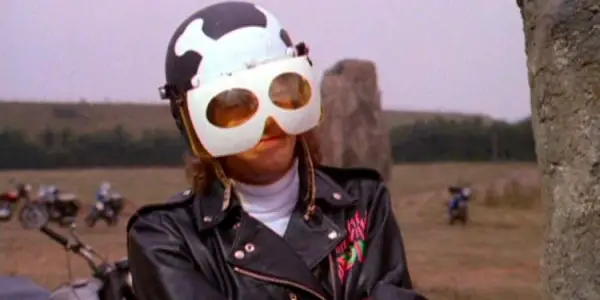
High above all that thick, fake blood, cod-Victorian set design and ursine, glued-on sideburns, Don Sharp’s 1972 zombie biker horror Psychomania is a film in a class of its own. So uniquely awful that it commands special consideration, yet as CinemaTV today said at the time, ‘Too well made to be entertaining except to those who have a yen to be motorcyclists going around killing people.’
It is utterly misconceived and hilariously inept in its own conception, yet it boasts a loyal following, hopelessly won over by its unique charms.
The Night of The Living Dead
Psychomania first announced itself to me, like so many marvellous films on BBC2’s much-missed Moviedrome presented by Alex Cox, in 1994. It was a double-bill, paired up with Girl on a Motorcycle, watched through bleary eyes in the midnight stages of a teenage house party.
Midnight, or thereabouts is the perfect time of day to properly appreciate a film like Psychomania. Few of one’s critical faculties are at their sharpest and a certain sponginess of the brain (naturally or artificially achieved) can only benefit the experience.
The film was written by Arnaud d’Usseau and Julian Zimet, whose other collaboration Horror Express was being filmed simultaneously with Peter Cushing and Christopher Lee. Bizarrely, in his Moviedrome introduction, Alex Cox seemed convinced that Arnaud d’Usseau was a pseudonym for the respected left-wing playwright David Hare.
Through The Past Darkly
And so Psychomania begins: a dewy mist swirling around standing stones. Gliding in and out of the smoke, silently and in slow motion come The Living Dead. Resplendent in their skull & crossbone crash helmets, The Living Dead are a group of teenage motorcycle enthusiasts.
While the titles let us know that legendary Oscar-winning actor George Sanders is somehow involved in this, The Living Dead perform a sequence of genuinely unimpressive stunts. Even so, John Cameron’s catchy funk guitar theme and the bilious dawn lighting help to make this an effective, intriguing opening.
One might posit the theory that this is actually the afterlife, presaging the doomed gang’s fate: an eternity riding formation patterns on low-horsepower motorbikes…but I suspect not.
Taking their cue from Kubrick’s just released A Clockwork Orange, The Living Dead specialise in gratuitous violence dispensed purely for the sake of it. Motorists tend to take the full brunt of their dastardly games, their tyres stabbed at and their vehicles forced into trees by these degenerate maniacs on motorcycles.
Unlike Kubrick’s droogs, however, the antagonists of Psychomania are all crisply well spoken middle-class denizens of Walton on Thames, whose time-out banter suggests what might have happened if the Famous Five had developed a taste for cheap cider and gone rogue.
One could suppose that this was a barbed comment from the filmmakers at the expense of so many ‘rebellious’ rock stars from bourgeoisie homes with three years of art school behind them…but I suspect not.
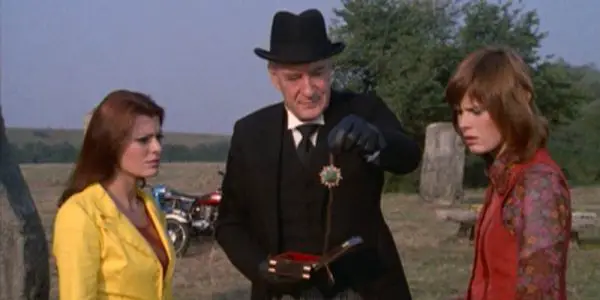
The poshest of the lot, and their de facto leader – take that, meritocracy! – is golden-haired Tom Latham, whose stately home and stately mother (Beryl Reid) are serviced by a silver-tongued domestic, Shadwell (George Sanders). There is devilry at play at the Latham manor; Shadwell’s reaction to the gift of an antique crucifix is a match for any of Christopher Lee’s anaphylactic cape-lifting hisses.
Perhaps this witchcraft is what has stopping the police from arresting any of The Living Dead gang even though they know exactly who they are and where they live? ‘The word,’ Tom corrects his mum helpfully, ‘is “Fuzz.”’ (‘Busted,’ we later learn, means ‘Arrested.’)
Tom has a lot on his mind besides crazy 1970’s terminology. A keen collector of frogs – ‘Maximus Leopardis, isn’t it?’ – he has of late become obsessed with the idea of committing suicide and returning from beyond the grave. Shadwell encourages him to enter ‘The Locked Room’ (just off the main lounge) into which his father wandered twenty years ago, never to return.
And so, Tom ventures forth and is haunted by misty hallucinations – initially of a frog being held up by an unseen prop handler – that suggest that as a babe in arms, he was sold over to the Devil himself by his own mother. For legal reasons, a contract is signed at the site of the standing stones (without a witness to countersign, take note). It’s all too much disclosure for Tom, who passes out in a delirious fit.
“You Can Only Die Once”
It is after this lysergic mind melt that Beryl Reid unwittingly gives her son the key to life beyond the grave. With her back turned away, she dolefully states, “When you die you’ve got to believe you’re going to come back. You’ve got to believe with all your being.”
That, according to the laws which govern the inner logic of Psychomania’s world, is literally all you have to do to achieve immortality: commit suicide…but actually want to come back from the dead.
Perhaps as one whose very soul is the property of Satan himself, Tom might have been gifted a special supernatural uniqueness, but it appears to be an open-door policy, and so the Home Counties are soon being terrorised by a nefarious zombie biker gang that cannot be injured or killed; a vicious gang with members called Gash, Hatchet, Chopped Meat and (brilliantly) Hinkey and Bertram.
As was previously suggested, Psychomania (or The Death Wheelers as it was rechristened for the US market) is if anything a little too well-made to be written off as pure, unadulterated crap. This probably had much to do with Don Sharp, who was an experienced helmsman, directing among many others Kiss of The Vampire, one of Hammer’s finest hours.
Occasionally, the film shifts up a gear into genuinely exceptional territory. Sharp at one point constructs a bravura set piece shot starting at a morgue full of policemen guarding a body, panning 360 degrees around the lab equipment and arriving back to find the body gone and the slabs now filled with the freshly murdered coppers.
The stunt work during some of the chase sequences is, or seems to be, perilously life-threatening with bikes missing oncoming cars by inches.
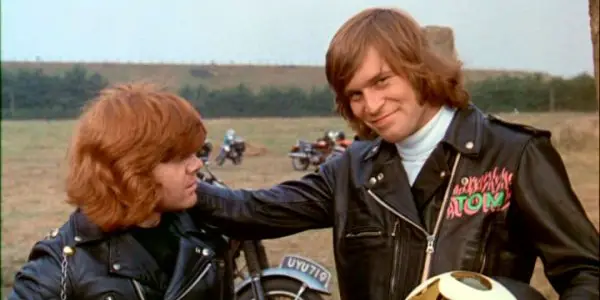
There is also a perverse glee that everyone in the cast (and presumably crew) seem to be in on, skipping from murder to mass murder with casual, Avengers-style nonchalance. Though entirely bloodless throughout – its initial X certificate was likely begged for by its producers Milton Subotsky-style – there is a dizzyingly high body count in Psychomania.
Apart from Tom’s indecisive, boyish girlfriend Abby and the devilish Shadwell, none of the cast make it to the end credits. There is even a taboo-baiting attack on a new-born baby during a biker swarm on the Hepworth Way shopping centre. The montage of ingeniously devised suicides at its midpoint suggest that everyone realised that this was actually a comedy all along. ‘She’s dead, Shadwell!’ yelps Tom delightedly at one point. ‘You must be very happy,’ purrs his Satanic retainer.
The incongruous Berkshire countryside setting gives the film a tentative foothold in the pastoral horrors of Matthew Hopkins: Witchfinder General. Also, the hilarious faux-Dylanesque guitar ballad that Chopped Meat plays at Tom’s funeral – “He loved to get it on / He rode that sweet machine just like a bomb…” tips a hat to the folk horror of The Wicker Man.
The funeral incidentally is a hoot, with Tom being buried sat on his motorcycle with his head and shoulders above ground level. Anything more than ten minutes of continuous rain would have washed away the topsoil in less than an hour, giving onlookers a ghoulish surprise. Not that it matters; Tom soon revs up the engine and bursts, Meatloaf-style from under the earth to run over a passing extra.
Cast Aside
Beryl Reid plays the role of Tom’s mother as a sort of bewildered Beryl Reid, and George Sanders is George Sanders. One can only imagine the poignant silences as they sat together in the canteen between takes and took stock of their current situation over a cheese sandwich and thought of better days.
Robert Hardy gamely plays the detective on their tails with stoic intensity and a fictitious Midlands accent. The biker gang are a fairly nondescript bunch. Ann Michelle, though, is playfully psychotic as the token hottie, Jane Pettibone.
There is also the 1970’s horror obelisk that is Denis Gilmore, whose cherubic globe-face and wheat-sheaf of copper-red hair had recently made a startling appearance in Blood on Satan’s Claw.
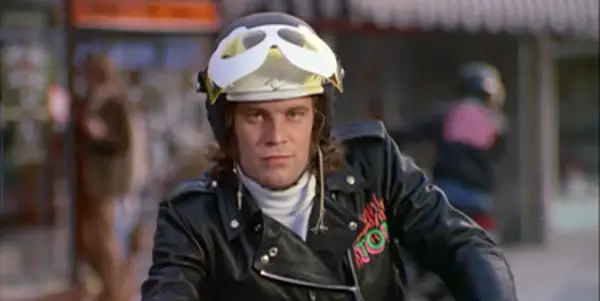
Nicky Henson, though, is a revelation. A leonine presence in painted-on leather, he exudes almost enough curiosity and vulnerability to offset the strutting, c*cksure pouting and typically misplaced youthful confidence. Manfully, he manages to get lines out like, ‘It’s not me that scares you Abby, it’s the world,’ with straight-faced conviction.
However, it is not a film Henson wears like a badge of honour (though his participation in the BFI’s new extras-packed DVD suggest that he might have recently warmed to its charms). ‘A piece of shit,’ was his brief review when questioned by film historian Matthew Sweet, who praised Psychomania for its ‘true spirit of exploitation.’
George Sanders’ opinion could be read between the lines of the suicide note he left in a Spanish hotel room a few months later.
‘We blew his mind. It was beautiful.’
Exploitation films at their most vital, snatch at whatever crumbs of contemporary culture still glow with the embers of potential revenue, and are traditionally slapped together with all the finesse of a toddler’s mud pie. It’s what gives them their charm.
Most likely, a casserole of disparate ingredients tossed together with scant regard for the final outcome will resemble the gelatinous brown distemper of a thousand school-dinner nightmares. Every now and then, though, you accidentally make Blanquette d’Agneau à l’Ancienne.
Don Sharp’s Pyschomania is such a feast, and 44 years after its release it has written its own unique chapter in the story of British cinema.
See my Psychomania and raise me The Monster Club? What is your nomination for the greatest Terrible Movie ever made; the one you feel paternally protective over despite its undeniably dreadful qualities? This is an amnesty, no one will judge you…
Psychomania is released on Dual Format Blu-ray/DVD in the UK on September 19th.
Does content like this matter to you?
Become a Member and support film journalism. Unlock access to all of Film Inquiry`s great articles. Join a community of like-minded readers who are passionate about cinema - get access to our private members Network, give back to independent filmmakers, and more.
Lapsed scriptwriter and dad, currently failing to encourage my children to watch black and white films. Alter-ego: a mild-mannered restaurateur in north Wales. Have been writing about films and food for three years in magazines like Cinema Retro and The Chap, and on websites like HeyUGuys.com and Taste of Cinema. Obsessed by cinema in all its forms.













